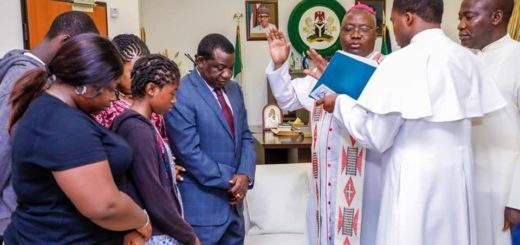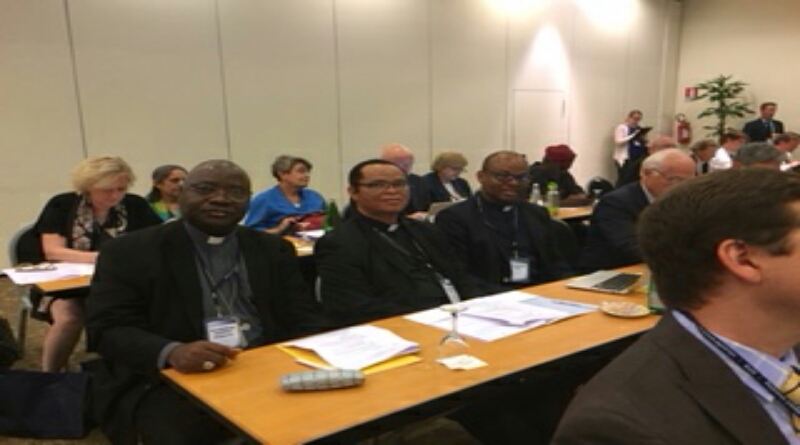Love of God and love of neighbour
by ARCH BISHOP · July 10, 2022
FIFTEENTH SUNDAY, YEAR C, JULY 10, 2022, ST. KEVIN’S PASTORAL AREA, KABUSA. HOMILY BY ARCHBISHOP I. A. KAIGAMA
READINGS: Deut. 30:10-14; Ps. 69: 14, 17, 30-31, 33-34, 36, 37; Col. 1:15-20; Lk. 10: 25-37.
Love of God and love of neighbour form one central theme of today’s readings (cf. Mt. 22:37-39, Mk. 12:29-31).
Jesus tells a parable of the Good Samaritan who offered help to one who was beaten by armed robbers and left to die. He was neglected by a priest and a Levite who passed that way. But a Samaritan who was moved with compassion offered help to the dying man. Through the parable of the Good Samaritan, Jesus teaches that class, religion, gender, or ethnicities do not determine who a neighbour is, and that the love of God and the love of neighbour (especially the poor and strangers) are the two most important criteria for entry into eternal life.
In the first reading, taken from Deuteronomy, we read the farewell message and final instruction of Moses to the Israelites as they journeyed towards the Promise Land. After their many trials and tribulations, the people of Israel were experiencing a period of peace, stability, tranquillity and prosperity. The tendency was for them to forget with time that they were a people of God on mission. So, Moses had the task of reminding them of the covenant they had made with God and he instructed them to heed the voice of God and keep His commandments and statutes that are written in the book of the law. He told them that the precepts of the Lord are not beyond human reach or locked away in some secret place. They are not only in the Sacred Scriptures, they are also written in human hearts for our remembrance and observance (cf. Jer. 31:33; Ezek. 36:26-27).
God is very near to us through those we come across and interact with each day. The injunction of Moses to the Israelites in the reading today is that we carefully study the Word of God and live out its tenets in the daily events of our lives.
The second reading asserts that Jesus is the highest revelation of God, and He lives in our neighbours. Just as Christ is the visible image of the invisible God, so also are our neighbours a visible image of Christ living in us. As we encounter Jesus everyday in our neighbours, we must love Jesus in them.
The Jews despised the Samaritans and Gentiles and considered them as ‘others’ to be avoided. Thus, the lawyer sought a clarification of the word, ‘neighbour’. The response of Jesus in the parable of the Good Samaritan indicates that a neighbor is anyone who needs help. It leads us to rather ask, ‘am I a good neighbour?’
The Gospel reading recounts the conversation of Jesus with a scholar of the law who in testing Jesus put a question to him, “teacher, what must I do to inherit eternal life?” (Lk. 10:25) Jesus responds by telling him to love the Lord above all things and to love neighbour as himself. In telling the story of the Good Samaritan who offered help to one who was beaten by armed robbers and left to die, Jesus uses the Good Samaritan to represent those who seek Christ in the weak, the wounded, and the needy; those who are mindful of the weak, despised, and abandoned.
The final admonition of Jesus to ‘go and do likewise’ (v. 37) is about mercy and compassion. It is to make a deliberate effort to show generosity to our neighbours who lie half dead on our streets, hospitals, IDP Camps, Prisons, and so on. We must get some oil and pour on their wounds: physical wounds, psychological wounds, emotional wounds, etc. Be the “Good Nigerian” that everyone is waiting to see.
In some of our cultures, our clan system excludes others who are not of our clan and we treat them with disdain even if we are of the same tribe, since we believe some are outcasts, while some are just thought very lowly of and should not be considered in the important scheme of things, forgetting that in Christ there is no longer Jew or Greek. It is surprising that even in marriage some Christians are told not to marry within a certain clan because of their lowly status.
Look at the example of the sad killings on July 4th in the US. The moment it happened, the security bodies were at their best, cooperating and looking out for the culprit. There was no dilly dallying or competition about which branch of security agency was to take the credit. They worked spiritedly to fish out the culprit within hours. Nigeria cannot apprehend the so-called unknown gunmen; even where circumstantial evidence points to the culprit. Authorities come up with baffling theories that obfuscate the effort to reveal the real enemies.
I pray the crop of new politicians will promote a national consciousness, a sense of honesty that you do not need to award a contract for ten billion Naira when three billion can do the project and our leaders will reject poisonous money realized from inflated contracts or compromised budgets, because such money is robbed from the poor and is evil money.




